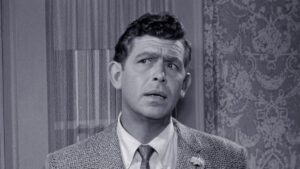
Andy Griffith: A TV Icon From Mayberry to “Matlock”
In a career that spanned half a century, actor and television comedian Andy Griffith starred in five different series, made more than 30 movies and even recorded a Grammy Award-winning gospel album. He died Tuesday morning in North Carolina at the age of 86.
Griffith had many starring performances, but there was one role that defined him for generations of fans. He was 34 years old in 1960 when he ventured into weekly television for the first time. The result was The Andy Griffith Show, an iconic series about an idyllic place — the fictional town of Mayberry, N.C., which seemed far removed from the real-life turbulence of the 1960s. Griffith reminisced about his starring role as Andy Taylor in a 1986 NPR interview.
“What was really the backbone of the show — we never talked about it — but the backbone of the show and the thrust of the show was love,” he said, “the deep regard that these people had for one another.”
Griffith’s success as a comic actor came even though his first dream in life was to be a serious singer. In college he majored in music, and as a young man, he set off for New York to audition for roles in operettas and jobs in choirs. But Griffith said the auditions failed to yield him a single offer.

“Instead of being hurt, I just started to wonder what I could do with the rest of my life. And I went home and wrote a few jokes,” Griffith said. “That summer, I did my first long monologue, and a man named Orville Campbell came up to me and said, ‘I have a record company. Would you like to record “What it Was Was Football”?’ And I said, ‘Yeah.’ “
That football monologue — released in 1953 — made Griffith famous, and helped propel him to Broadway and then Hollywood. Initially, he played a variety of roles, including a maniacal wannabe politician in his debut movie, A Face in the Crowd. But he later settled into the comfortable persona of a wise, Southern patriarch, a role that served him well both in his Mayberry days and on his second TV hit, the law drama Matlock.
Ron Howard played Opie on The Andy Griffith Show. In a 1995 interview on Fresh Air, Howard said Griffith brought a rare down-home honesty to their on-screen relationship.
“You know, they always have the kids in situations comedies be brats,” Howard said. “And they really are kids that you kind of think, ‘God, somebody ought to just discipline that kid.’ But the Andy-Opie relationship was more of a real relationship, where when the kid gets out of line, the father does something about it. And the kid respects the father instead of being just a wise guy all the time. And Andy really took to that, and it’s one of the things that differentiates it from what we’re accustomed to seeing on sitcoms.”
Griffith scaled back his TV appearances after Matlock went off the air. And freed from the burdens of weekly television, he rediscovered the singing career he dreamed of as a teenager. While in his 70s, Griffith recorded a series of gospel albums. Speaking with NPR in 1996, he expressed hope that his hymns — like his TV shows — would hearken back to another era.
“Things have changed so much,” Griffith said. “People walked away from a simple life we had in the ’20s and ’30s, and I am glad that I am able to touch that period in our lives with the shows that I do and with the music that I do.”
A statue of Griffith as Andy Taylor stands in Raleigh, N.C., the capital of his home state. The inscription reads: “A simpler time, a sweeter place, a lesson, a laugh, a father, a son” — words that Griffith said nicely summarize the legacy he hoped to leave behind.
